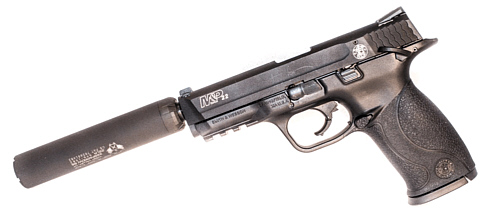

Texas Removes Ban on
Gun Suppressors, "Silencers"

By Dean Weingarten. July 7, 2021
Article Source
On 15 June, 2021, Governor Greg Abbot signed Texas HB 957 into law. The new law removes the Texas prohibition on firearm suppressors, commonly known as silencers or gun mufflers. From the bill:
"Firearm suppressor" means any device designed, made, or adapted to muffle the report of a firearm.
From the legislative history, it appears silencers, suppressors or gun mufflers were first banned in Texas in 1973. Although they were banned in Texas law, there was an affirmative defense from prosecution if the gun mufflers were legally possessed under federal law, as shown in this AmmoLand article from 2014.
As you can see, lawful registration in accordance with the National Firearms Act is a "defense to prosecution". In Texas, any "defense to prosecution" has to be disproven by the state beyond a reasonable doubt. If reasonable doubt is established that the item in question is properly registered, the state requires that the defendant be acquitted.
Texas changed the affirmative defense to clear law with the passage of HB 1819 in 2017. It removed the sweeping prohibition of silencers from Texas law, but granted sovereignty over silencer regulation to the federal government. The federal government requires a payment of a $200 tax and numerous regulatory requirements to possess such items.
From the federal statutes:
The terms "firearm silencer" and "firearm muffler" mean any device for silencing, muffling, or diminishing the report of a portable firearm, including any combination of parts, designed or redesigned, and intended for use in assembling or fabricating a firearm silencer or firearm muffler, and any part intended only for use in such assembly or fabrication.
Silencers will no longer be banned under Texas law when HB 957 goes into effect on 1 September, 2021.
HB 957 enacts strong anti-commandeering language.
Texas state resources shall not be allowed to enforce the federal National Firearms Act with respect to silencers, suppressors, or gun mufflers. If any Texas official aids in the enforcement of NFA silencer law, they are subject to losing any grant funds from the State of Texas for the following fiscal year. From HB 957:
Sec. 2.103. STATE GRANT FUNDS. (a) An entity described by Section 2.101 may not receive state grant funds if the entity adopts a rule, order, ordinance, or policy under which the entity enforces a federal law described by Section 2.102(a) or, by consistent action, allows the enforcement of a federal law described by Section 2.102(a)
.(b) State grant funds for the entity shall be denied for the fiscal year following the year in which a final judicial determination in an action brought under this subchapter is made that the entity has violated Section 2.102(a).
Once the law goes into effect, people in Texas will have to work at being prosecuted for the possession of a suppressor without an NFA tax stamp.
How would anyone know if the suppressor is possessed with a tax stamp or not, unless the possessor is in the habit of bragging about not having a tax stamp, or if they broadcast their possession of an unregulated suppressor on social media?
Both such situations have occurred.
There may be prosecutions for illegal importations of suppressors. There have been a couple of those in the last two years, in the entire USA.
Texas is the largest market for NFA items in the USA. There were 401,861 silencers registered with the ATF in Texas as of April, 2020. In 2011, there were 36,204.
This correspondent found only one Texas prosecution for an illegal silencer in Texas, in the last 5 years. It was Rick Montevealvo in Houston, in 2019. There were multiple other charges and warrants. Montevealvo had no criminal record, but had a considerable record of mental issues.
The Texas reform of silencer law is part of the broad movement to reform or repeal the National Firearms Act.
Arkansas repealed its ban on silencers in 2019. Texas law goes further, with the strong anti-commandeering provision.
From this correspondent's review of state firearms laws, as collected by the ATF, 22 states do not have a state prohibition on the possession of silencers.
There is more. HB957 sets up a test case of the extraordinary powers which have been given to the federal government by the Supreme Court, under the current bizarre interpretation of the Interstate Commerce Clause.
Those implications will be discussed in a future article.
©2021 by Dean Weingarten: Permission to share is granted when this notice and link are included. Gun Watch
![]()

























